- Home
- Michael Ondaatje
The English Patient Page 7
The English Patient Read online
Page 7
‘Ah yes, it is a great face.’
‘You saw it.’
‘Yes. Isaiah.’
When the Eighth Army got to Gabicce on the east coast, the sapper was head of night patrol. On the second night he received a signal over the shortwave that there was enemy movement in the water. The patrol sent out a shell and the water erupted, a rough warning shot. They did not hit anything, but in the white spray of the explosion he picked up a darker outline of movement. He raised the rifle and held the drifting shadow in his sights for a full minute, deciding not to shoot in order to see if there would be other movement nearby. The enemy was still camped up north, in Rimini, on the edge of the city. He had the shadow in his sights when the halo was suddenly illuminated around the head of the Virgin Mary. She was coming out of the sea.
She was standing in a boat. Two men rowed. Two other men held her upright, and as they touched the beach the people of the town began to applaud from their dark and opened windows.
The sapper could see the cream-coloured face and the halo of small battery lights. He was lying on the concrete pillbox, between the town and the sea, watching her as the four men climbed out of the boat and lifted the five-foot-tall plaster statue into their arms. They walked up the beach, without pausing, no hesitation for the mines. Perhaps they had watched them being buried and charted them when the Germans had been there. Their feet sank into the sand. This was Gabicce Mare on May 29, 1944. Marine Festival of the Virgin Mary.
Adults and children were on the streets. Men in band uniforms had also emerged. The band would not play and break the rules of curfew, but the instruments were still part of the ceremony, immaculately polished.
He slid from the darkness, the mortar tube strapped to his back, carrying the rifle in his hands. In his turban and with the weapons he was a shock to them. They had not expected him to emerge too out of the no-man’s-land of the beach.
He raised his rifle and picked up her face in the gun sight – ageless, without sexuality, the foreground of the men’s dark hands reaching into her light, the gracious nod of the twenty small light bulbs. The figure wore a pale blue cloak, her left knee raised slightly to suggest drapery.
They were not romantic people. They had survived the Fascists, the English, Gauls, Goths and Germans. They had been owned so often it meant nothing. But this blue and cream plaster figure had come out of the sea, was placed in a grape truck full of flowers, while the band marched ahead of her in silence. Whatever protection he was supposed to provide for this town was meaningless. He couldn’t walk among their children in white dresses with these guns.
He moved one street south of them and walked at the speed of the statue’s movement, so they reached the joining streets at the same time. He raised his rifle to pick up her face once again in his sights. It all ended on a promontory overlooking the sea, where they left her and returned to their homes. None of them was aware of his continued presence on the periphery.
Her face was still lit. The four men who had brought her by boat sat in a square around her like sentries. The battery attached to her back began to fade; it died at about four-thirty in the morning. He glanced at his watch then. He picked up the men with the rifle telescope. Two were asleep. He swung the sights up to her face and studied her again. A different look in the fading light around her. A face which in the darkness looked more like someone he knew. A sister. Someday a daughter. If he could have parted with it, the sapper would have left something there as his gesture. But he had his own faith after all.
Caravaggio enters the library. He has been spending most afternoons there. As always, books are mystical creatures to him. He plucks one out and opens it to the title page. He is in the room about five minutes before he hears a slight groan.
He turns and sees Hana asleep on the sofa. He closes the book and leans back against the thigh-high ledge under the shelves. She is curled up, her left cheek on the dusty brocade and her right arm up towards her face, a fist against her jaw. Her eyebrows shift, the face concentrating within sleep.
When he had first seen her after all this time she had looked taut, boiled down to just body enough to get her through this efficiently. Her body had been in a war and, as in love, it had used every part of itself.
He sneezed out loud, and when he looked up from the movement of his tossed-down head she was awake, the eyes open staring ahead at him.
‘Guess what time it is.’
‘About four-oh-five. No, four-oh-seven,’ she said.
It was an old game between a man and a child. He slipped out of the room to look for the clock, and by his movement and assuredness she could tell he had recently taken morphine, was refreshed and precise, with his familiar confidence. She sat up and smiled when he came back shaking his head with wonder at her accuracy.
‘I was born with a sundial in my head, right?’
‘And at night?’
‘Do they have moondials? Has anyone invented one? Perhaps every architect preparing a villa hides a moondial for thieves, like a necessary tithe.’
‘A good worry for the rich.’
‘Meet me at the moondial, David. A place where the weak can enter the strong.’
‘Like the English patient and you?’
‘I was almost going to have a baby a year ago.’
Now that his mind is light and exact with the drug, she can whip around and he will be with her, thinking alongside her. And she is being open, not quite realizing she is awake and conversing, as if still speaking in a dream, as if his sneeze had been the sneeze in a dream.
Caravaggio is familiar with this state. He has often met people at the moondial. Disturbing them at two a.m. as a whole bedroom cupboard came crashing down by mistake. Such shocks, he discovered, kept them away from fear and violence. Disturbed by owners of houses he was robbing, he would clap his hands and converse frantically, flinging an expensive clock into the air and catching it in his hands, quickly asking them questions, about where things were.
‘I lost the child. I mean, I had to lose it. The father was already dead. There was a war.’
‘Were you in Italy?’
‘In Sicily, about the time this happened. All through the time we came up the Adriatic behind the troops I thought of it. I had continued conversations with the child. I worked very hard in the hospitals and retreated from everybody around me. Except the child, who I shared everything with. In my head. I was talking to him while I bathed and nursed patients. I was a little crazy.’
‘And then your father died.’
‘Yes. Then Patrick died. I was in Pisa when I heard.’
She was awake. Sitting up.
‘You knew, huh?’
‘I got a letter from home.’
‘Is that why you came here, because you knew?’
‘No.’
‘Good. I don’t think that he believed in wakes and such things. Patrick used to say he wanted a duet by two women on musical instruments when he died. Squeeze-box and violin. That’s all. He was so damn sentimental.’
‘Yes. You could really make him do anything. Find him a woman in distress and he was lost.’
The wind rose up out of the valley to their hill so the cypress trees that lined the thirty-six steps outside the chapel wrestled with it. Drops of earlier rain nudged off, falling with a ticking sound upon the two of them sitting on the balustrade by the steps. It was long after midnight. She was lying on the concrete ledge, and he paced or leaned out looking down into the valley. Only the sound of the dislodged rain.
‘When did you stop talking to the baby?’
‘It all got too busy, suddenly. Troops were going into battles at the Moro Bridge and then into Urbino. Maybe in Urbino I stopped. You felt you could be shot anytime there, not just if you were a soldier, but a priest or nurse. It was a rabbit warren, those narrow tilted streets. Soldiers were coming in with just bits of their bodies, falling in love with me for an hour and then dying. It was important to remember their names. But I kept seeing the chi
ld whenever they died. Being washed away. Some would sit up and rip all their dressings off trying to breathe better. Some would be worried about tiny scratches on their arms when they died. Then the bubble in the mouth. That little pop. I leaned forward to close a dead soldier’s eyes, and he opened them and sneered, “Can’t wait to have me dead? You bitch!” He sat up and swept everything on my tray to the floor. So furious. Who would want to die like that? To die with that kind of anger. You bitch! After that I always waited for the bubble in their mouths. I know death now, David. I know all the smells, I know how to divert them from agony. When to give the quick jolt of morphine in a major vein. The saline solution. To make them empty their bowels before they die. Every damn general should have had my job. Every damn general. It should have been a prerequisite for any river crossing. Who the hell were we to be given this responsibility, expected to be wise as old priests, to know how to lead people towards something no one wanted and somehow make them feel comfortable. I could never believe in all those services they gave for the dead. Their vulgar rhetoric. How dare they! How dare they talk like that about a human being dying.’
There was no light, all lamps out, the sky mostly cloud-hidden. It was safer not to draw attention to the civilisation of existing homes. They were used to walking the grounds of the house in darkness.
‘You know why the army didn’t want you to stay here, with the English patient? Do you?’
‘An embarrassing marriage? My father complex?’ She was smiling at him.
‘How’s the old guy?’
‘He still hasn’t calmed down about that dog.’
‘Tell him he came with me.’
‘He’s not really sure you are staying here either. Thinks you might walk off with the china.’
‘Do you think he would like some wine? I managed to scrounge a bottle today.’
‘From?’
‘Do you want it or not?’
‘Let’s just have it now. Let’s forget him.’
‘Ah, the breakthrough!’
‘Not the breakthrough. I badly need a serious drink.’
‘Twenty years old. By the time I was twenty …’
‘Yes, yes, why don’t you scrounge a gramophone someday. By the way, I think this is called looting.’
‘My country taught me all this. It’s what I did for them during the war.’
He went through the bombed chapel into the house.
Hana sat up, slightly dizzy, off balance. ‘And look what they did to you,’ she said to herself.
Even among those she worked closely with she hardly talked during the war. She needed an uncle, a member of the family. She needed the father of the child, while she waited in this hill town to get drunk for the first time in years, while a burned man upstairs had fallen into his four hours of sleep and an old friend of her father’s was now rifling through her medicine chest, breaking the glass tab, tightening a bootlace round his arm and injecting the morphine quickly into himself, in the time it took for him to turn around.
At night, in the mountains around them, even by ten o’clock, only the earth is dark. Clear grey sky and the green hills.
‘I was sick of the hunger. Of just being lusted at. So I stepped away, from the dates, the jeep rides, the courtship. The last dances before they died – I was considered a snob. I worked harder than others. Double shifts, under fire, did anything for them, emptied every bedpan. I became a snob because I wouldn’t go out and spend their money. I wanted to go home and there was no one at home. And I was sick of Europe. Sick of being treated like gold because I was female. I courted one man and he died and the child died. I mean, the child didn’t just die, I was the one who destroyed it. After that I stepped so far back no one could get near me. Not with talk of snobs. Not with anyone’s death. Then I met him, the man burned black. Who turned out to be, up close, an Englishman.
‘It has been a long time, David, since I thought of anything to do with a man.’
After a week of the Sikh sapper’s presence around the villa they adapted to his habits of eating. Wherever he was – on the hill or in the village – he would return around twelve-thirty and join Hana and Caravaggio, pull out the small bundle of blue handkerchief from his shoulder bag and spread it onto the table alongside their meal. His onions and his herbs – which Caravaggio suspected he was taking from the Franciscans’ garden during the time he spent there sweeping the place for mines. He peeled the onions with the same knife he used to strip rubber from a fuze wire. This was followed by fruit. Caravaggio suspected he had gone through the whole invasion never eating from a mess canteen.
In fact he had always been dutifully in line at the crack of dawn, holding out his cup for the English tea he loved, adding to it his own supply of condensed milk. He would drink slowly, standing in sunlight to watch the slow movement of troops who, if they were stationary that day, would already be playing canasta by nine a.m.
Now, at dawn, under the scarred trees in the half-bombed gardens of the Villa San Girolamo, he takes a mouthful of water from his canteen. He pours tooth powder onto the brush and begins a ten-minute session of lackadaisical brushing as he wanders around looking down into the valley still buried in the mist, his mind curious rather than awestruck at the vista he happens now to be living above. The brushing of teeth, since he was a child, has always been for him an outdoor activity.
The landscape around him is just a temporary thing, there is no permanence to it. He simply acknowledges the possibility of rain, a certain odour from a shrub. As if his mind, even when unused, is radar, his eyes locating the choreography of inanimate objects for the quarter-mile around him, which is the killing radius of small arms. He studies the two onions he has pulled out of the earth with care, aware that gardens too have been mined by retreating armies.
At lunch there is Caravaggio’s avuncular glance at the objects on the blue handkerchief. There is probably some rare animal, Caravaggio thinks, who eats the same foods that this young soldier eats with his right hand, his fingers carrying it to his mouth. He uses the knife only to peel the skin from the onion, to slice fruit.
The two men take a trip by cart down into the valley to pick up a sack of flour. Also, the soldier has to deliver maps of the cleared areas to headquarters at San Domenico. Finding it difficult to ask questions about each other, they speak about Hana. There are many questions before the older man admits having known her before the war.
‘In Canada?’
‘Yes, I knew her there.’
They pass numerous bonfires on the sides of the road and Caravaggio diverts the young soldier’s attention to them. The sapper’s nickname is Kip. ‘Get Kip.’ ‘Here comes Kip.’ The name had attached itself to him curiously. In his first bomb disposal report in England some butter had marked his paper, and the officer had exclaimed, ‘What’s this? Kipper grease?’ and laughter surrounded him. He had no idea what a kipper was, but the young Sikh had been thereby translated into a salty English fish. Within a week his real name, Kirpal Singh, had been forgotten. He hadn’t minded this. Lord Suffolk and his demolition team took to calling him by his nickname, which he preferred to the English habit of calling people by their surname.
That summer the English patient wore his hearing aid so he was alive to everything in the house. The amber shell hung within his ear with its translations of casual noises -the chair in the hall scraping against the floor, the click of the dog’s claws outside his room so he would turn up the volume and even hear its damn breathing, or the shout on the terrace from the sapper. The English patient within a few days of the young soldier’s arrival had thus become aware of his presence around the house, though Hana kept them separate, knowing they would probably not like each other.
But she entered the Englishman’s room one day to find the sapper there. He was standing at the foot of the bed, his arms hung over the rifle that rested across his shoulders. She disliked this casual handling of the gun, his lazy spin towards her entrance as if his body were the axle of a wheel,
as if the weapon had been sewn along his shoulders and arms and into his small brown wrists.
The Englishman turned to her and said, ‘We’re getting along famously!’
She was put out that the sapper had strolled casually into this domain, seemed able to surround her, be everywhere. Kip, hearing from Caravaggio that the patient knew about guns, had begun to discuss the search for bombs with the Englishman. He had come up to the room and found him a reservoir of information about Allied and enemy weaponry. The Englishman not only knew about the absurd Italian fuzes but also knew the detailed topography of this region of Tuscany. Soon they were drawing outlines of bombs for each other and talking out the theory of each specific circuit.
‘The Italian fuzes seem to be put in vertically. And not always at the tail.’
‘Well, that depends. The ones made in Naples are that way, but the factories in Rome follow the German system. Of course, Naples, going back to the fifteenth century …’
It meant having to listen to the patient talk in his circuitous way, and the young soldier was not used to remaining still and silent. He would get restless and kept interrupting the pauses and silences the Englishman always allowed himself, trying to energize the train of thought. The soldier rolled his head back and looked at the ceiling.
‘What we should do is make a sling,’ the sapper mused, turning to Hana as she entered, ‘and carry him around the house.’ She looked at both of them, shrugged and walked out of the room.
When Caravaggio passed her in the hall she was smiling. They stood in the hall and listened to the conversation inside the room.
Did I tell you my concept of Virgilian man, Kip? Let me …
Is your hearing aid on?
What?
Turn it –
‘I think he’s found a friend,’ she said to Caravaggio.
She walks out into the sunlight and the courtyard. At noon the taps deliver water into the villa’s fountain and for twenty minutes it bursts forth. She removes her shoes, climbs into the dry bowl of the fountain and waits.

 In the Skin of a Lion
In the Skin of a Lion The Cinnamon Peeler
The Cinnamon Peeler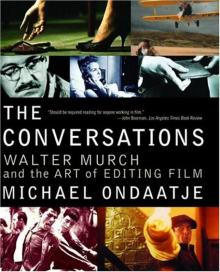 The Conversations: Walter Murch and the Art of Editing Film
The Conversations: Walter Murch and the Art of Editing Film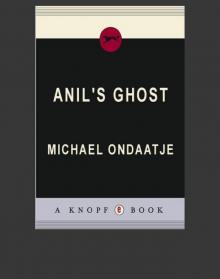 Anil's Ghost
Anil's Ghost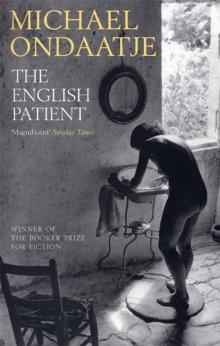 The English Patient
The English Patient Coming Through Slaughter
Coming Through Slaughter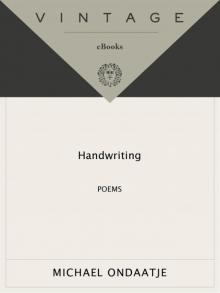 Handwriting
Handwriting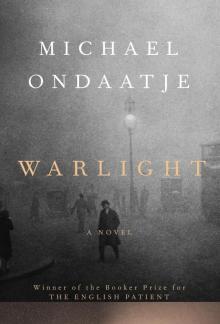 Warlight
Warlight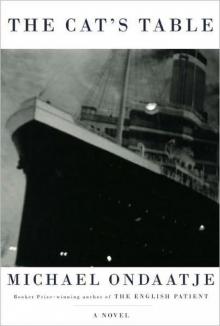 The Cat's Table
The Cat's Table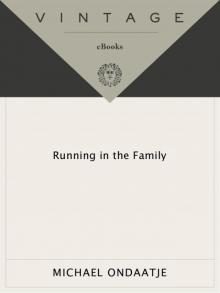 Running in the Family
Running in the Family The Collected Works of Billy the Kid
The Collected Works of Billy the Kid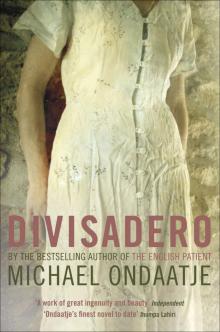 Divisadero
Divisadero